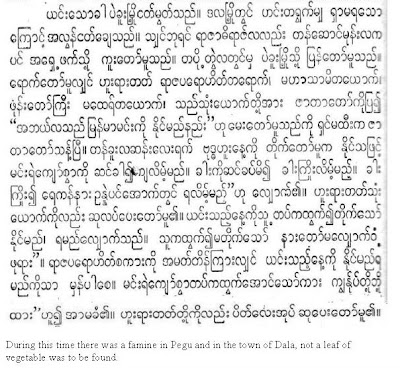This is a translation of chapters from the Mon-Burmese epic Razadarit Ayeidawpon. Both the Burmese and an English translation are given.
The epic tale of Rajadhirat records the history of a long war between Mon Lower Burma and Burman Upper Burma (c. 1383-1425). The epic survives to this day in a collection of manuscripts written in three different languages: Mon, Burmese, and Thai:
- Introduction
- Rajadhirat epic translation.
- Condensed version of epic in academic paper.
- Interesting sentences and vocabulary list.
Wednesday, February 20, 2008
Monday, January 14, 2008
5. Emuntaya’s deception to lure Minyekyawswa into battle



"Rajadhirat then wondered how Minyekyawswa might be advised that he would be in Dala. Emuntaya volunteered to have this accomplished by going over to Minyekyawswa as if he had defected from his side. Asked to furnish further details, he said he would say that he was disenchanted with his monarch for failing to pursue a more aggressive policy and for not taking action to dislodge the besiegers of Dala and with Deinmaniyut for not acting like a general as he was supposed to be; that for speaking out his mind he was threatened with the death penalty and to have his whole family clapped in irons by Deinmaniyut; that the king backed Deinmaniyut so that he had decided to defect and serve under Minyekyaswa; that he would then participate with the prince’s nobles in one or two actions to further gain Minyekyaswa's confidence after which he would return to Dala. The king agreed with this plan and gave him five viss (18 pounds / 8 kg) of gold to be distributed among nobles and citizens of Dala." (edited version of San Lwin's English translation, 141; Binnyadala in Burmese, 315, Note: San Lwin's translation seems to paraphrase and condense a lot here)
6. Emuntaya deserts from the Mon to the Burmese


Dala was heavily surrounded by Myanma troops on both the river side and the land side. When Emuntaya arrived, at Dala's port Chinthe (lion) they were stopped by the garrison commander of the Panpe garrison (htaung-hmu) and the lord of Myo-taung who were blocking the route through at this point.
When the lord of Myo-taung saw them, he asked them who they were. "I am Emuntaya, and after suffering disappointment at the hands of my lord, I request to be received by the lord of the Golden Palace as a servant," he asked the lord of Myo-taung. Emuntaya spoke in the manner that he had proposed to the king. When they heard this, they gave him find Basoes, fine shirts, wrapped up in a bundle and brought Emuntaya from Myo-taung and presented him to Minyekyawswa. Minyekyawswa questioned him. Emuntaya responded in the same way as he had answered the lord of Myo-taung. After that, when Yazathinkyan had listened to him, he addressed the king.
"Such is the lord Minyekyawswa's great royal glory and power (hpon-daw-gyi) that the royal uncle's minister, the noble (thu-yei-kaung) Emuntaya, has arrived here to be received as a royal servant. If what Emuntaya says is true, when the royal desire for Pegu has been fulfilled (i.e. Pegu has been conquered) he should be given any domain to rule over than he desires (myo-sa)." And when Yazathinkyan had spoken, Emuntaya in turn spoke, "This servant has suffered disappointment at the hands of his lord, and have arrived at the royal feet of the son of the lord of the golden palace. Henceforth, I will bear the burden or royal affairs (enter royal service), and from the time I cut down my own people, the Mons, you will place your royal trust in me," Emuntaya spoke thus. Emuntaya was presented with gifts. ." (edited version of San Lwin’s English translation, 141; Binnyadala in Burmese, 315-316)
Subscribe to:
Comments (Atom)






